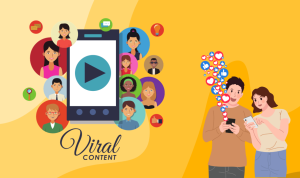Stars Who Shared Mood-Boosting Moments Online sets the stage for an exciting exploration into how celebrities use their platforms to uplift spirits and spread positivity. In a world where social media dominates our interactions, many public figures take the opportunity to share moments that resonate with their audience, offering a glimpse into their lives that can brighten someone’s day. From heartfelt messages to lighthearted antics, these stars remind us of the power of community and the simple joys that can stem from shared experiences.

Whether it’s a funny meme, an inspiring quote, or a candid moment of joy, these posts serve as a testament to the uplifting potential of online interactions. The way celebrities connect with their fans through relatable content not only boosts morale but also fosters a sense of belonging, showcasing that even in tough times, we can find reasons to smile together.
In the ever-evolving landscape of technology, one topic that has captured the imagination of both professionals and the general public alike is artificial intelligence (AI). It’s not just a trend; it’s a transformative force that is reshaping industries, influencing how we live, work, and interact. This article explores the multifaceted world of AI, its implications, applications, and the ethical considerations that accompany its rise.To begin with, let’s define what artificial intelligence actually is.
At its core, AI refers to the simulation of human intelligence processes by machines, especially computer systems. These processes include learning (the acquisition of information and rules for using it), reasoning (using the rules to reach approximate or definite conclusions), and self-correction. AI has branched out into several subfields, including machine learning, natural language processing, robotics, and computer vision, among others.Machine learning, one of the most talked-about aspects of AI, is a method of data analysis that automates analytical model building.
It’s based on the idea that systems can learn from data, identify patterns, and make decisions with minimal human intervention. For instance, algorithms can analyze vast datasets to predict consumer behavior, which is invaluable for businesses looking to optimize their strategies.Natural language processing (NLP) is another significant area of AI that focuses on the interaction between computers and humans through natural language.
It enables machines to understand, interpret, and generate human language in a valuable way. Applications of NLP range from chatbots providing customer service to sophisticated systems like Google Translate that break down language barriers. Robotics, a field that overlaps with AI, involves creating machines that can execute tasks in the physical world, often mimicking human actions. From industrial robots assembling cars to drones delivering packages, robotics powered by AI is making processes more efficient and versatile.
Computer vision, another critical area, allows machines to interpret and make decisions based on visual data. This technology is pivotal in various applications, from facial recognition systems to autonomous vehicles that navigate through complex environments. The potential is vast, and its implications for safety and efficiency are profound.AI is not merely about technology; it has real-world applications that manifest across a wide array of sectors.
In healthcare, AI is revolutionizing patient care and medical diagnostics. Machine learning algorithms can analyze medical images with remarkable accuracy, often outperforming human radiologists. Moreover, AI-driven systems can sift through electronic health records to predict potential health issues and suggest preventive measures. In the financial sector, AI algorithms are used for fraud detection, risk management, and personalized banking. By analyzing transaction patterns, AI systems can flag unusual activities that might indicate fraud.
Additionally, robo-advisors provide personalized investment advice based on individual risk preferences and financial goals, democratizing access to investment strategies once reserved for the wealthy.Education is also experiencing the impact of AI, with personalized learning experiences being created through adaptive learning technologies. These systems assess a student’s strengths and weaknesses and modify the curriculum accordingly, ensuring that each learner engages with material suited to their needs.
This tailored approach can improve educational outcomes and enhance the learning experience.The transportation sector is witnessing a paradigm shift with the advent of autonomous vehicles. Companies like Tesla and Waymo are at the forefront of developing self-driving technologies that promise to reduce accidents, optimize traffic flow, and revolutionize urban planning. However, this transition is not without challenges, as issues related to safety, ethics, and liability still need thorough examination.Despite the numerous benefits brought by AI, it is crucial to acknowledge the ethical considerations that arise with its implementation.
One of the most pressing concerns is the potential for bias in AI algorithms. If the data used to train these systems contain inherent biases, the AI will likely perpetuate and even amplify these biases, leading to unfair outcomes in areas such as hiring, law enforcement, and credit lending. Transparency is another significant ethical issue. The decision-making processes of AI systems can often be opaque, making it difficult to understand how conclusions are reached.
This lack of clarity can pose challenges, especially in critical sectors like healthcare and criminal justice, where lives and liberties hang in the balance.Data privacy also presents a significant concern. As AI systems rely on vast amounts of personal data to function effectively, the risk of breaches and misuse increases. Ensuring that individuals’ data is handled responsibly and securely is paramount to maintaining public trust in AI technologies.The potential for job displacement due to AI automation is another topic of widespread discussion.
While AI can enhance efficiency and productivity, it may also render certain jobs obsolete, leading to economic disruption and social challenges. It’s essential for governments, businesses, and educational institutions to work together to prepare the workforce for these changes, promoting reskilling and upskilling initiatives that can help individuals transition into new roles.As we look toward the future, it is clear that the trajectory of AI will continue to be influenced by both its technological advancements and the societal frameworks that guide its development.
Promoting responsible AI development that prioritizes ethical considerations, transparency, and inclusivity will be crucial in harnessing its full potential while mitigating risks.In conclusion, artificial intelligence stands as a landmark achievement in technological progress. Its potential to transform industries and improve our lives is immense, but it also brings with it a host of challenges that we must address. By fostering a culture of responsible innovation and ongoing dialogue, we can navigate the complexities of AI, ensuring that it serves as a force for good in society.
The journey ahead will undoubtedly be fascinating, as we continue to explore the myriad possibilities that AI has to offer.
Detailed FAQs: Stars Who Shared Mood-Boosting Moments Online
Why do celebrities share mood-boosting moments?
They share these moments to connect with their audience, spread positivity, and show their human side.
How do mood-boosting posts affect fans?
They help fans feel uplifted, connected, and often provide a sense of community during tough times.
What types of content do celebrities share to boost moods?
Content can include funny videos, inspirational quotes, personal stories, and candid moments.
Can mood-boosting posts impact mental health?
Yes, they can significantly improve mental health by fostering a sense of belonging and joy.
What platforms do celebrities use to share these moments?
Common platforms include Instagram, Twitter, TikTok, and Facebook.






